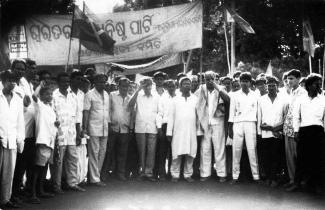
I entered the cabin in Kolkata SSKM Hospital, and called him by his name. He opened his eyes and said, “I'm not being able to do any party work.” Comrade Shobhona, a professional nurse in another Hospital who used to attend him regularly after her duty hours, was there. She and many other comrades, young and old volunteered to provide day-and-night care for their ‘Pranab da’. Shobhona said, “Pranabda, where are you now”'? He replied, “At Durgapur, in a comrade's shelter; to expand party work here.”
This was Comrade Pranab: semi-conscious and struggling with cancer, yet consistent on the question of whole-hearted devotion to party work. Comrade Pranab, along with others from the Durgapur Regional Engineering College, refused to become an engineer who built mere bridges and buildings; to build a new society, he and his young comrades integrated with the Durgapur Steel workers. Worker-vanguards from that generation continue to be with the Party and came to stand by him around his hospital bed. Imprisonment and severe torture in an isolation cell broke and permanently injured his leg but could never break his spirit and only further emboldened his commitment to revolution and the Party.
We never heard him say “no” or hesitate take up any responsibility given by the Party. He was always ready to lead the Party in periods of crises; to build the party in new areas; and to re-build the party even where it had been reduced to ashes. In recent years, he often expressed his unhappiness: no, never any personal grievances or discomforts, but because of the 'restrictions' imposed on his work and mobility due to his ill health!
At they bid farewell to Pranab da, several comrades across generations said that in Pranab da, we have lost a leader in whom we could feel free to open our mind; sure that he would give us a close and patient hearing and guide us.”
In the evening after the funeral, I got a taxi from our Creek Row office to Howrah. To my surprise, the taxi driver calmly asked me, “Were you here for Bakshiji’s funeral?” Surprised, I said, “Yes, how come you know him?” He replied, “Some comrades from Bagodar, my native place, too came; I took them to the funeral procession.” He continued, “Bakshi da had been to our village, stayed in our house many times, he helped unite our village - men and women, old and young - with the party. I myself was then young and did not know the party, but thanks to him I became a party activist. For us, he is no less than one of our own family members.” In a choked voice, he added, “I met him at the Kolkata office too.” When we reached Howrah, he helped me carry my bag upto the station gate, and when I offered to pay the fare, he held my hand warmly and refused! Anyway, I put the fare in his pocket and urged him keep in touch with the party office.
I also remember my brief meeting with Dr. Choudhary who treated Comrade Pranab from beginning to the end. He told me, “Such people are most needed for our society. I tried my best to save his life, but ultimately could not.” Dr Choudhary said “I have come across many leaders - but Bakshi was in my opinion a rare breed of dedicated Communists very much needed today.”
Comrade Pranab is no more but will remain alive as a source of inspiration for us.
Liberation Archive
- 2001-2010
-
2011-2020
- 2011
- 2012
- 2013
- 2014
- 2015
- 2016
- 2017
-
2018
- January-2018
- February-2018
- March-2018
- May 2018
- June-2018
- July 2018
- August 2018
-
September 2018
- Resolve of Independence Day 2018: End the Disastrous Modi Regime to Stop the Lynch Mobs and Loot Brigades
- Atal Bihari Vajpayee And The Evolution Of The Indian Right
- Defeat the BJP's Divisive Agenda over NRC
- ABP Resignations: The Truth Of A Modi-Managed And Modi-Muzzled Media
- Sanghi Terror Out In The Open
- Banking Sector And Modi Govt
-
Comrade DP Bakshi (17 May 1948 – 26 July 2018)
- Outstanding Communist Organiser And Inspiring Representative of the Revolutionary Legacy and Spirit of Naxalbari
- He Touched the Hearts and Minds of All Who Knew Him
- A Man for All Seasons
- Comrade Bakshi Is Very Much With Us
- Unforgettable Role in Building the Party in Assam
- An Eye For Detail
- An Inspiration for Railway Comrades
- He Lived For The Party
- From Seventeen to Seventy, A Dedicated Life for Revolution
- Baba, My Comrade!
- Muzaffarpur Shelter Home Rapes: Dark Underbelly of 'Beti Bachao'
- Farmers Court Arrest on August 9 During Countrywide Jail Bharo
- Tea Workers' Strike in West Bengal
- Report of Fact Finding Team on Undeclared Emergency-Like Situation in Tripura
- Kuldip Nayyar: Tireless Defender of Democracy
- Adieu, Prof. Samir Amin
- International Solidarity: Attempt to Attack Bolivarian Revolution Fails
- Stop the repression of students in Bangladesh!
- Disturbing Reports of Persecution of Muslims in China
- Comrade Somnath Chatterjee
- Stand With Kerala!
- October 2018
- November 2018
- December 2018
- 2019
- 2020
- 2021-2030
Charu Bhawan, U-90, Shakarpur, Delhi 110092
Phone: +91-11-42785864 | Fax:+91-11-42785864 | +91 9717274961
E-mail: info@cpiml.org







